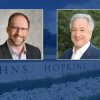Two Johns Hopkins education researchers, Jonathan Plucker and David Steiner, have once again landed on the annual “Edu-Scholar Public Influence Rankings,” compiled by American Enterprise Institute director of education policy studies and Education Week blogger Frederick M. Hess. The annual list spotlights the top 200 U.S. university-based education scholars who move academic ideas from scholarly discussions into the national conversation, providing relevant contributions to vital public-policy debates.
Jonathan Plucker, the Julian C. Stanley Endowed Professor of Talent Development and recently appointed associate dean of faculty affairs at the School of Education, examines education policy and talent development, as well as the implications of the high levels of principal and superintendent turnover that most states are experiencing. Plucker currently is partnering with school districts to explore options for creating equitable systems for advanced learning and, later this year, plans to publish a book of essays on the future of talent development with contributions from several Hopkins faculty. He is also a nationally recognized expert on creativity and innovation.
David Steiner is a professor and the executive director of the Johns Hopkins Institute for Education Policy, where his research focuses on education reform in K-12 schools nationwide. His recent focus on acceleration strategies as a response to COVID urges educators to focus solely on teaching skills that correlate to what students will need to know in the near future rather than remediating lessons lost to school closures. This spring will see the publication of Steiner’s book A National at Thought: Restoring Wisdom in America’s Schools – an analysis of US K-12 education and a vision for its future.
This annual recognition, released on January 5, is important to the School of Education as the division continues to create knowledge and translate it into means for impact. Johns Hopkins education researchers’ efforts to reach beyond academia to connect with the greater educational community is directly in line with Hess’ vision of impactful educators: “One small way to encourage academics to step into the fray and revisit academic norms is, I think, by doing more to recognize and value those scholars who engage in public discourse.”

